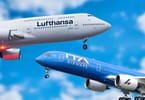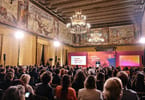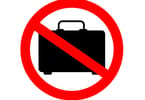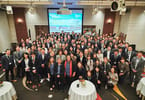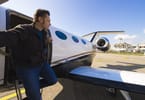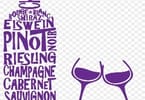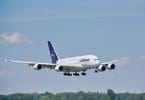Airline CEOs call for a new revolution in European aviation.
In the United States. Delta, United and American Airlines had teamed up against Qatar Airways, Emirates and Etihad Airways.
Europe has now formed its own gang of currently 5 major European airlines.
The CEOs of Europe’s five largest airline groups – Air France KLM, easyJet, International Airlines Group, Lufthansa Group and Ryanair – met collectively for the first time today (17 June) and agreed to work together to lobby for the development of a new EU Aviation Strategy that will support growth and jobs across Europe, strengthen the sector and give Europe’s passengers lower fares and more choice.
The meeting took place (in Brussels) in response to the new EU Transport Commissioner Violeta Bulc’s consultation on a new EU Aviation Strategy. The five agreed a vision for this strategy that would match the revolution in aviation that the liberalisation of Europe’s airline sector created a generation ago, through the creation of the internal aviation market.
The five airlines identified four measures that would support the Commission‘s objectives of enhancing the competitiveness of the European air transport industry both at European and international level, supporting growth and jobs across Europe and which would help consumers through the provision of more flights and lower fares.
These measures are:
The development of an EU Aviation strategy with a plan for a simple efficient regulatory structure, which would strengthen the competitiveness of European airlines, ensure jobs and growth through innovation (e.g. Horizon 2020), protect consumer interests and promote more efficiency to reduce costs.
Lowering the cost of the EU’s airports by ensuring that monopoly airports are effectively regulated; ensuring that passengers receive the full benefit of the commercial revenues which they create at airports; and that security charges are efficient. This could be achieved by reforming the Airport Charges Directive.
Delivering reliable and efficient airspace by reducing the cost of ATC provision; ensuring that ATC strikes do not cause disruption to passengers across Europe; resetting the Single European Sky strategy by focusing on using new technology to make efficiency savings; and using SESAR funding to drive compliance with the Single Sky framework.
Stimulating more economic activity and jobs by creating the right regulatory environment, removing passenger taxes and unreasonable environmental taxes.
The five CEOs – Alexandre de Juniac, Carolyn McCall, Willie Walsh, Carsten Spohr and Michael O’Leary – outlined their vision:
“Europe’s airlines form the most competitive sector in aviation with a diverse mix of carriers offering competition and choice to consumers.This is the first time we have set aside our competitive battles to highlight the importance of a new European Aviation Strategy.
“The liberalisation of aviation in Europe in the 1990’s, creating a fully liberalised single market with a comprehensive common regulatory framework 18 years ago, strongly enhanced competition across Europe.As a result, consumers have benefited with substantially lower fares and more routes across Europe and to the rest of the world. At the same time, EU airlines have maintained leading safety standards. The range and quality of services have increased and airline costs have fallen by 1 – 2% per year for the last two decades.
“We believe that this decline should now be matched by a reduction in those costs which airlines do not control themselves.
“As the new Transport Commissioner prepares a new Aviation Strategy for Europe she must drive more competition, encourage more efficiency and help reduce costs in other parts of our industry (such as monopoly airports and Air Traffic Control providers) and reduce the tax burden on passengers.”
Aviation is a proven driver of economic growth and jobs. The proposed measures will create many hundreds of thousands of jobs – particularly for young people, at a time of high youth unemployment in countries such as Italy or Spain – and increase Europe’s GDP. The group will write to the EU Transport Commissioner Violeta Bulc asking for these measures to be put in place.
Alongside the proposed policy positions the five CEO’s confirmed their support for several key principles and action items which should underpin EU aviation policy. The most important of these is the commitment to safety and ensuring that safety standards are developed based on a risk based scientific assessment.
The CEOs confirmed their support for the liberalisation of the whole aviation value chain and for pro-competition policy and regulation within the EU. They also confirmed their opposition to the provision of State-aid, as a general principle, to airlines and airports. They agreed that EU and national regulation and policies should support the efficient delivery of services, and that this includes the need for efficient operations to minimise the environmental impact of aviation. The importance of balanced consumer rights was also underlined; EU and national policies need to ensure that consumer rights are respected.
The CEOs agreed to work together to encourage the Commission and EU member states to take up the proposed measures. The five airlines agreed that airline representation in Brussels today is not as effective as it could be – with six airline representative organisations – and agreed to explore possible forms of future representation.
The five airlines between them carried a total of 420 million passengers in 2014, accounting for half of the passenger journeys in Europe.
WHAT TO TAKE AWAY FROM THIS ARTICLE:
- The five airlines identified four measures that would support the Commission‘s objectives of enhancing the competitiveness of the European air transport industry both at European and international level, supporting growth and jobs across Europe and which would help consumers through the provision of more flights and lower fares.
- The five agreed a vision for this strategy that would match the revolution in aviation that the liberalisation of Europe's airline sector created a generation ago, through the creation of the internal aviation market.
- “As the new Transport Commissioner prepares a new Aviation Strategy for Europe she must drive more competition, encourage more efficiency and help reduce costs in other parts of our industry (such as monopoly airports and Air Traffic Control providers) and reduce the tax burden on passengers.




